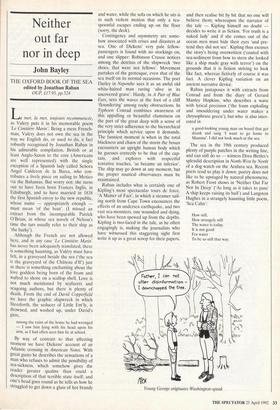Neither out far nor in deep
John Bayley
THE OXFORD BOOK OF THE SEA edited by Jonathan Raban OUP, £17.95, pp.524 La mer, la mer, toujours recommencee, as Valery puts it in his memorable poem 'Le Cimitiere Marin'. Being a mere French- man, Valery does not own the sea in the way we English do, or used to do, a fact robustly recognised by Jonathan Raban in his admirable compilation, British or at least Anglo-Saxon to the core (Americans are well represented) with the single exception of a Spanish lady called Senora Angel Calderon de la Barca, who con- tributes a lively piece on sailing to Mexico via the Bahamas. But worry not: she turns out to have been born Frances Inglis, in Edinburgh, and to have married in 1838 the first Spanish envoy to the new republic, whose name — appropriately enough must mean 'of the boat'. (I missed an extract from the incomparable Patrick O'Brian, in whose sea novels of Nelson's time the tars usually refer to their ship as `the barky').
Although the French are not allowed here, and in any case `Le Cimitiere Madn' has never been adequately translated, there is something haunting, as Valery must have felt, in a graveyard beside the sea (`the sea is the graveyard of the Château d'If) just as there is something enchanting about the love goddess being born of the foam and wafted to shore on a scallop shell. Love is not much mentioned by seafarers and seagoing authors, but there is plenty of death. From the end of David Coppetfield We have the graphic shipwreck in which Steerforth, the seducer of Little Em'ly, is drowned, and washed up, under David's gaze,
among the ruins of the home he had wronged — I saw him lying with his head upon his arm, as I had often seen him lie at school.
By way of contrast to that affecting moment we have Dickens' account of an Atlantic crossing in American Notes. With great gusto he describes the sensations of a man who refuses to admit the possibility of sea-sickness, which somehow gives the reader greater qualms than could a description of that terrible state itself; and one's head goes round as he tells us how he struggled to get down a glass of hot brandy and water, while the sofa on which he sits is in such violent motion that only a tea- spoonful escapes ending up on the floor (sorry, the deck).
Contingency and asymmetry are some- how associated with crises and disasters at sea. One of Dickens' very pale fellow- passengers is found with no stockings on, and one slipper: Robinson Crusoe notices among the detritus of the shipwreck 'two shoes, that were not fellows'. Movement partakes of the grotesque, even that of the sea itself on its normal occasions. The poet Darley in Nepenthe sees it as an awful old white-haired man raving 'alive in its uncovered grave'. Hardy, in A Pair of Blue Eyes, sees the waves at the foot of a cliff `floundering' among rocky obstructions. In Typhoon Conrad combines awareness of this appalling or beautiful clumsiness on the part of the great deep with a sense of the very strict adherence to the hierarchical principle which service upon it demands. The funniest moment is when in the total blackness and chaos of the storm the bosun encounters an upright human body which he guesses correctly to be that of the cap- tain, and explores with respectful tentative touches, 'as became an inferior'. The ship may go down at any moment, but the proper nautical observances must be maintained.
Raban includes what is certainly one of Kipling's most spectacular tours de force, `A Matter of Fact', in which a steamer sail- ing north from Cape Town encounters the effects of an undersea earthquake, and two vast sea-monsters, one wounded and dying, who have been spewed up from the depths. Kipling is two-faced in the tale, as he often engagingly is, making the journalists who have witnessed this staggering sight first write it up as a great scoop for their papers, and then realise bit by bit that no one will believe them; whereupon the narrator of the tale — Kipling himself no doubt decides to write it as fiction. Tor truth is a naked lady' and if she comes out of the ocean men must hide their eyes 'and pre- tend they did not see'. Kipling thus excuses the story's being overwritten ('coated with sea-sediment from bow to stern she looked like a ship made gray with terror') on the grounds that it is fiction striving to look like fact, whereas fictively of course it was fact. A clever Kipling variation on an ancient narrative device.
Raban juxtaposes it with extracts from Conrad and from the diary of Gerard Manley Hopkins, who describes a wave with lyrical precision (`the foam exploding and smouldering under water makes a chrysophrase green'), but who is also inter- ested in
a good-looking young man on board that got drunk and sang 'I want to go home to Mamma'. I did not look much at the sea.
The sea in the 19th century produced plenty of purple patches in the writing line, and can still do so — witness Dora Birtles's splendid description in North-West by North of a dog watch on the Arafura sea. Recent poets tend to play it down: poetry does not like to be upstaged by natural phenomena, as Robert Frost shows in 'Neither Out Far Nor In Deep' (`As long as it takes to pass/ A ship keeps raising its hull') and Langston Hughes in a strangely haunting little poem, `Sea Calm':
How still, How strangely still The water is today.
It is not good For water To be so still that way.
Young George originates Washington-speak


























































 Previous page
Previous page